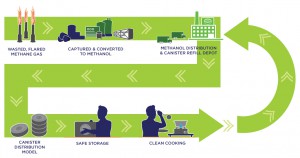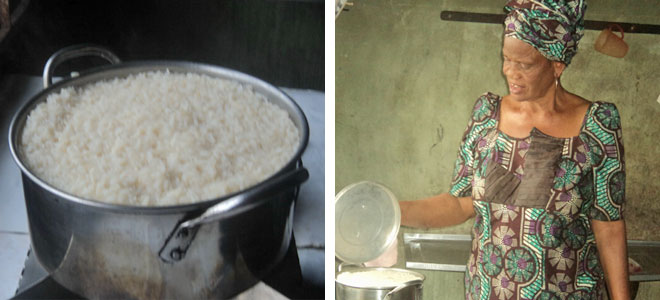Meet Mrs. Theresa Ailenmoagboan. She is one of Nigeria’s most recent converts to the CleanCook alcohol stove.
Nigeria is the economic hub of West Africa, but most of its population live below the poverty line and suffer from prevalent Household Air Pollution (HAP). With one of the fastest growing populations and economies in the world, the landscape in Nigeria is quickly changing. Currently, the population of 167 million is evenly distributed between rural and urban areas. However, Nigeria is rapidly becoming more urban and its natural resources, particularly forests, are stressed. It was Nigeria’s natural resources that first got Project Gaia involved.
 Our work began in 2002 with a scoping trip by Project Gaia, Electrolux (now Dometic), and Hydrochem Linde. The group was brought together to explore the possibility of methanol for clean cooking. Nigeria is the largest producer of oil and gas in Africa, with much of its production and exploration conducted in the Niger Delta and offshore. At night, the Delta is lit up from natural gas flaring. Methane is one of these gases and, with the proper infrastructure, it can easily be turned into methanol, an ideal clean fuel for cooking. During this initial trip, we met Joe Obueh, now the Director of Project Gaia Nigeria, and have been working with him ever since to create a local market for methanol and hasten the stop to flaring.
Our work began in 2002 with a scoping trip by Project Gaia, Electrolux (now Dometic), and Hydrochem Linde. The group was brought together to explore the possibility of methanol for clean cooking. Nigeria is the largest producer of oil and gas in Africa, with much of its production and exploration conducted in the Niger Delta and offshore. At night, the Delta is lit up from natural gas flaring. Methane is one of these gases and, with the proper infrastructure, it can easily be turned into methanol, an ideal clean fuel for cooking. During this initial trip, we met Joe Obueh, now the Director of Project Gaia Nigeria, and have been working with him ever since to create a local market for methanol and hasten the stop to flaring.
Last month, Project Gaia Nigeria piloted a new stove in Benin City with a denatured fuel mixture of methanol and ethanol. In her 70’s, Theresa was one of the women who participated in the study, and she had a lot to say about switching to alcohol fuels.
- What is your family size? Three. Although we used to be over eight because some relatives lived with us in the past. My children are now adults who no longer live here, and my husband has retired to the village.
- What do or did you do for a living? I am a retired civil servant.
- What were you using to cook with before you received an alcohol stove and fuel? We used a kerosene stove and a ethanol gel stove. I rarely use the gel stove, but when I do, it is just to boil water and heat up food.
- How were you getting your fuel? Is the fuel easily accessible? Do you have to travel far to get fuel? A trader in the market brings kerosene to me at home because it is too stressful to buy from the filling stations. She supplies me 20 liters and it lasts for about 5 weeks.
- How much do you spend on fuel? It fluctuates. Sometimes, I can get kerosene at N2500 ($15.43), N2800 ($17.28), or even N3000 ($18.52). When there is a fuel scarcity, the 20 liters could cost N3200 ($19.73) or N3300 ($20.37). A 5L gallon of the gel fuel costs N1100 ($6.79) but I have not used it in a long while because the tank is too small and the fuel does not last long.
- Which other stoves/fuel have you used apart from your current stove/fuel? Firewood.
- Why did you stop using them? I still use it, but only for festive occasions when a large quantity of food is required. For every day cooking, I just use the kerosene stove since it can cook the quantity of food I require.
- How does cooking affect you and your family’s life and health? Food is good for the health; it sustains our life and is necessary to stay alive. The odor produced when a kerosene stove is turned off affects the eyes.

Theresa’s children, her 100+ year-old mother, her nephew, and her. - How did you learn to cook? What is your favorite thing to cook and why? I learned to cook from my mother, and my favorite thing to cook is rice and beans because my children like rice so, I cook it along with beans. When my husband was in the city, I prepared pounded yams for him daily.
- What meals do you like to prepare with the alcohol stove? Why? I like preparing any of the food I decide to cook with the alcohol stove, because it is a new product, and I want to try it out.
- How has cooking with alcohol impacted your life? I spend a lot less money on kerosene.
- What does your daily schedule look like? I do household chores and prepare food. I attend church service three times a week, and I go to the market sometimes.
- What do you like about the alcohol stove and fuel? It does not darken pots, does not produce smoke, is portable, and the smell of the ethanol is unoffensive.
- Is it more convenient to use? Since it is portable, when I finish cooking, carrying it is easier than my kerosene stove.
- Would you like to purchase it when it is commercialized? Yes, I’ll be the first to buy! I will also tell others. A double burner should be made, or it could be even be fashioned like a gas cooker and have cylinders for fuel storage. People will like that.
- How do you think the alcohol stove will benefit residents of Benin City/ Nigerians? Women will no longer suffer from smoke while cooking or spend time washing soot-blackened pots because this stove does not darken pots. The financial burden of re-painting kitchen walls is also removed because kitchen walls will not get stained with smoke.
By Omo Oikeh and Hilary Landfried

